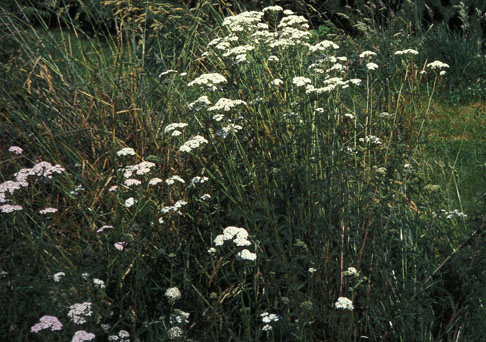
|
| Yarrow; Achillea Millefolium L. |
Sunflower Family; COMPOSITÆ (ASTERACEÆ)
|
| Yarrow is standard in weed, wildflower, and medicinal plant guides. Well known, it is widely distributed in the northern
hemisphere; native in some areas (including Seattle's saltwater beaches) and naturalized in others. Several subspecies are recognized as well
as ornamental garden versions. |
| It loves sunshine but tolerates partial shade once it becomes established. Enduring poor soil and very dry conditions, it thrives
in meadows, vacant lots, highway edges, near railroad tracks and in neglected lawns. It spreads by vigorous vertical root-action and
by reseeding. Erect stems from one to four-and-a-half feet tall bear
flat clusters of numerous small white or pink-tinged flowers, mostly
seen (May) June through October, with some lasting into winter. If you cultivate it (cut the spent flowers, water it) blooms can be had
nearly any month. Its foliage is finely cut, soft, fernlike and evergreen. The whole plant smells and tastes strongly, warmly aromatic. |
| People variously view Yarrow. It is not very potent medicinally, yet has been used over the centuries by herbalists for its
astringent, tonic, stimulant, antispasmodic and vulnerary properties. The burning flavor of a few of its leaves add zest to mixed salads.
Researching the rationale behind some of its English names proves pleasant. Such names include Milfoil, Woundwort, Devil's Nettle, Nosebleed,
Old Man's Pepper, and Deadman's Daisy. |
| As a weed, it is chiefly significant when infesting lawns. A lawn full of it needs either total renovation (regular fertilizing,
watering, mowing, etc.) or a dose of poison. Hand-weeding Yarrow from a lawn won't work unless very little is present and the weeder is
persistent and picky. |
In the Language of Flowers, Yarrow usually symbolizes "war." This is an understandable sentiment that means not
fight the weed, but rather that yarrow was thought used by ancient warriors to staunch bloodflow. Other times it is said Yarrow signifies "a cure
for heartache" and that is certainly desirable. One source nearly overdoes it by asserting Yarrow means: "Thou alone canst cure!" Thus,
you may call Yarrow whatever you like and regard it as friend or foe. In any case you have company.
|
Originally published as the Seattle Tilth newsletter Weed of the Month in March 1987, along with an illustration from a book.
Back |
|
|

